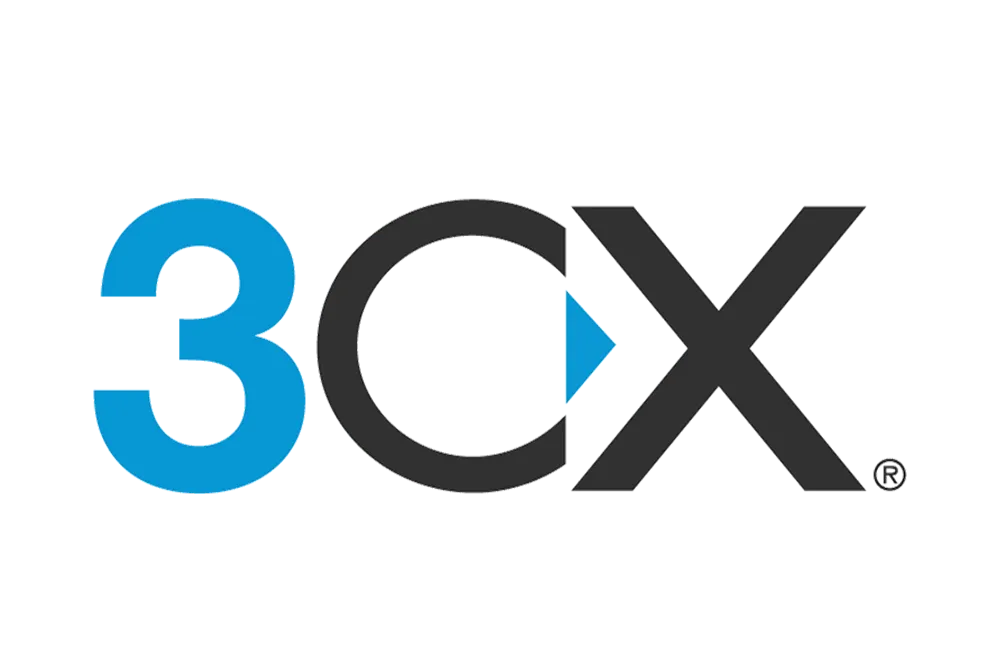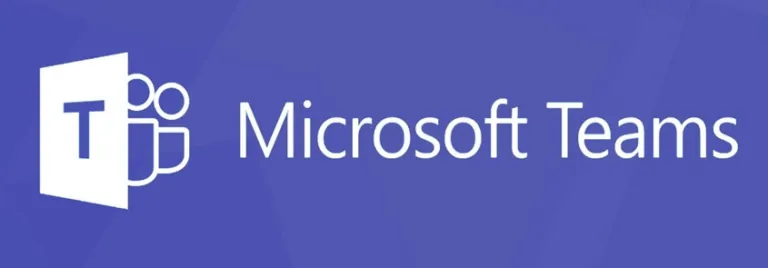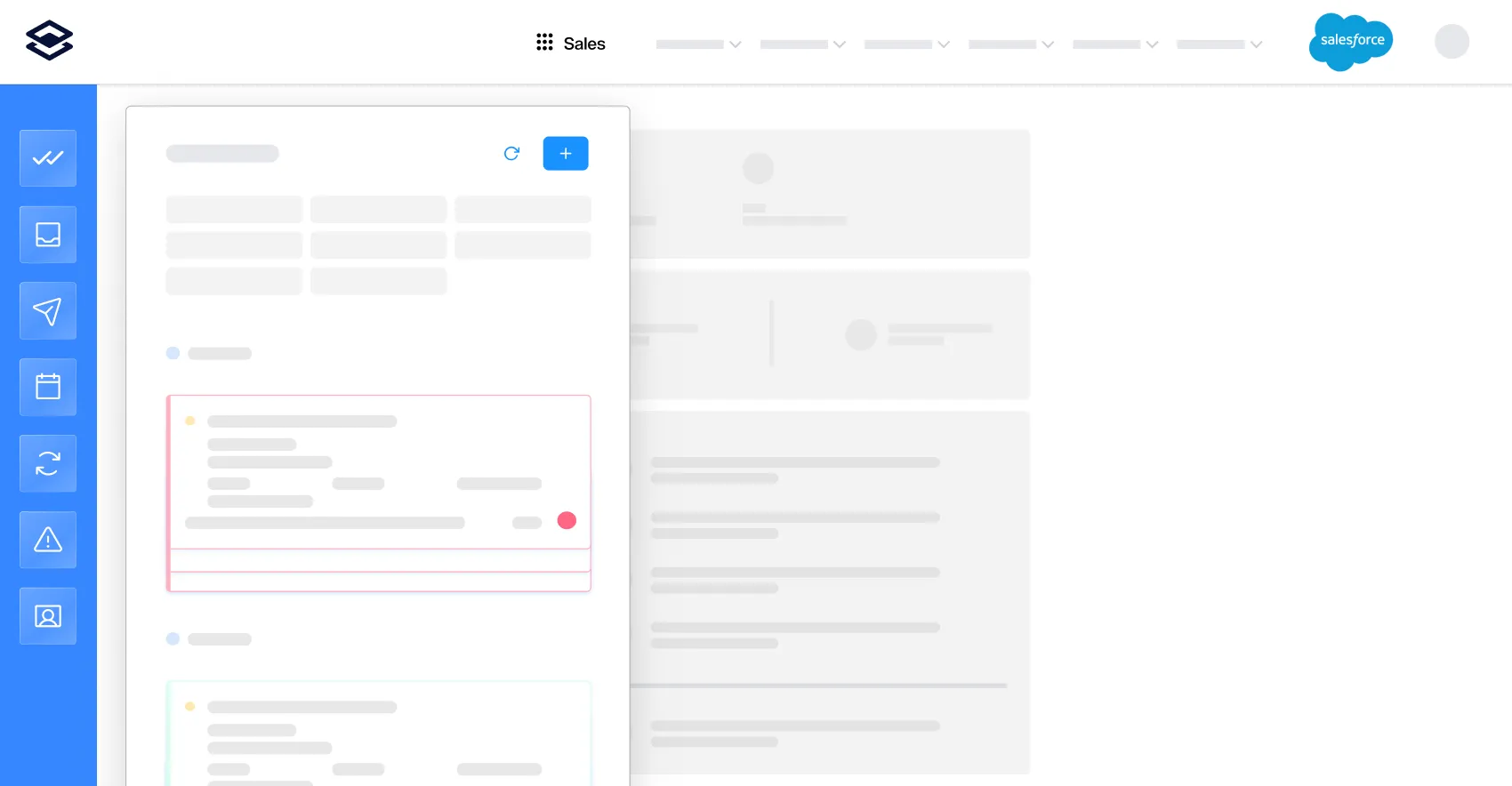We use cookies to personalize content, provide social media features and analyze traffic. You can get more information by visiting our cookie policy. You can configure cookies without accepting them by clicking hither.
These are the 15 best VoIP solutions for businesses in 2026:
- Harmonix AI
- RingCentral MVP
- Zoom Phone
- 3CX
- Vonage Business Communications
- Dialpad
- Aircall
- Nextiva
- Ooma Office
- GoTo Connect
- Microsoft Teams Phone
- OpenPhone
- CloudTalk
- Netelip
- Zadarma
Communication tools have evolved rapidly, and among them, VoIP solutions have become key allies for businesses of all sizes.
For modern communication needs, VoIP businesses can significantly benefit from integrated call center software solutions.
To maximize the value of these tools, many companies choose to complement them with Salesforce telephony, ensuring that every call is seamlessly logged inside the CRM and directly tied to opportunities, follow-ups, and customer history.
In a context where efficiency and flexibility make the difference, the 15 best VoIP solutions for 2026 stand out for their ability to adapt to different environments and needs.
Today more than ever, organizations look for platforms that help streamline tasks, reduce costs and centralize communication.
The key lies in choosing systems that integrate multiple channels like calls, emails and WhatsApp in a single environment.
This omnichannel capability not only improves the user experience, but also enhances decision-making by offering a complete, contextualized view.
In the following sections, you’ll discover the most notable platforms of the year, their main benefits, and how they can help transform how your company communicates.
Top 15 VoIP Solutions for Businesses in 2026
1. Harmonix AI

Harmonix AI is not a CRM nor just a VoIP tool.
It’s an artificial intelligence platform that installs on top of any existing CRM, like Salesforce, Dynamics or SAP, enhancing it from within without replacing it or starting a new integration project.
With Harmonix, companies can integrate multiple communication channels, calls, emails, WhatsApp, LinkedIn, into one place, enabling a true contact center experience.
This allows you to capture and analyze 100% of interactions, not just the 5% usually registered in traditional CRMs.
Additionally, its AI can automate administrative tasks, suggest content and follow-up emails, summarize key interactions and create tasks automatically, streamlining workflow automation across the system.
This makes users work faster, with more context and greater efficiency.
5 Key highlights of Harmonix AI:
- Total omnichannel capability: Unifies voice, email, WhatsApp and LinkedIn inside your CRM.
- Smart automation: The CRM updates itself, with no manual input.
- Strategic insights: Provides market, sales, revenue and quality
- intelligence.Fast, frictionless installation: Works on top of your current CRM, no migrations.
- Increased productivity: Fewer repetitive tasks, more focus on what matters.
No guesswork. See real results in your tailored demo session.
2. RingCentral MVP

RingCentral MVP offers an all-in-one business communication solution, combining calls, messages and video conferences on a single platform.
Its focus on mobility and collaboration makes it an ideal choice for distributed teams.
Main features:
- Full-featured mobile app.
- Integrations with Microsoft Teams and Salesforce.
- Advanced calling and conferencing features.
3. Zoom Phone

Zoom Phone extends Zoom’s capabilities to include VoIP telephony directly into its ecosystem.
It’s ideal for companies that already use Zoom and want to consolidate communications.
Main features:
- Smooth transition between calls and meetings.
- Visual voicemail and smart call forwarding.
- Compatible with mobile and desktop devices.
4. 3CX

3CX is a software-based PBX focused on flexibility and user control.
It’s ideal for companies looking for a robust solution without compromising technical autonomy.
Main features:
- Video calls and instant messaging.
- Deployment options: on-premise or cloud.
- Live chat for customer support.
5. Vonage Business Communications
Vonage Business Communications unifies voice, video and messaging on a single platform.
Its versatility and scalability make it ideal for growing businesses.
Main features:
- CRM and productivity tool integration.
- Mobile and desktop apps.
- Advanced call management features.
6. Dialpad

Dialpad incorporates artificial intelligence to enhance calls, messaging and virtual meetings.
Its modern approach facilitates productivity from any location.
Main features:
- Real-time transcription.
- Conversation sentiment analysis.
- Integration with Google Workspace and Microsoft 365.
7. Aircall

Aircall is a cloud-based VoIP solution, especially designed for sales and support teams.
Its interface is simple and offers useful integrations.
Main features:
- CRM and helpdesk integration.
- Call queues and auto-assignment.
- Real-time performance reporting.
8. Nextiva
Nextiva offers a complete communication solution combining telephony, messaging and collaboration.
It’s recognized for its high-quality technical support.
Main features:
- Team chat and video conferencing.
- Automation of communication tasks.
- Detailed usage and performance analytics.
9. Ooma Office

Ooma Office is a simple, affordable phone solution, perfect for small businesses seeking functionality without complexity.
Main features:
- Fast, easy setup.
- Essential features like forwarding and voicemail.
- Mobile apps to work from anywhere.
10. GoTo Connect

GoTo Connect merges VoIP with video conferencing and messaging, ideal for companies seeking an all-in-one solution.
Main features:
- HD video conferences and collaboration.
- Call recording and multichannel support.
- Integration with productivity tools like Teams or Slack.
11. Microsoft Teams Phone

Microsoft Teams Phone adds VoIP calling features to the Microsoft collaboration ecosystem, all inside the same app.
Main features:
- Full integration with Microsoft 365.
- Advanced features for business calls.
- Scalability for large teams.
12. OpenPhone

OpenPhone is a modern, minimalist phone solution, ideal for startups and small teams.
Main features:
- Custom professional numbers.
- Integration with Slack and CRM.
- Mobile and desktop applications.
13. CloudTalk

CloudTalk is a cloud-based call center platform, designed to improve sales and support team performance.
Main features:
- Automatic call distribution.
- CRM integrations.
- Detailed metrics and call analytics.
14. Netelip

Netelip provides VoIP solutions tailored to the Spanish market, ideal for businesses looking for a local, cost-effective alternative.
Main features:
- Virtual numbers, national and international.
- Cloud-based call management.
- Technical support in Spanish.
15. Zadarma

Zadarma is a VoIP and virtual PBX platform, focused on customization and savings.
It’s widely used by companies seeking autonomy.
Main features:
- Free virtual PBX with advanced features.
- Numbers available in over 100 countries.
- Integration with business tools.
These are the 15 best VoIP solutions for businesses in 2026, each with features that respond to different needs.
When choosing, consider scalability, automation level, omnichannel integration, and the value they can bring to your daily operations.
What is a VoIP Solution and How Does It Work?
A VoIP solution (Voice over IP) allows you to make calls over the internet instead of using traditional phone networks.
This means that conversations travel as data, which reduces costs and improves flexibility.
Unlike conventional telephony, VoIP enables the integration of different communication channels like calls, emails or WhatsApp into a single platform.
This omnichannel capability has become essential for companies seeking agility and efficiency.
The operation is simple: all you need is an internet connection and a compatible software.
From there, you can make and receive calls, share messages, automate tasks, and even connect with other business tools like a CRM or ERP.
When VoIP solutions are combined with intelligent tools, such as those offered by Harmonix AI, the result is a much more dynamic environment.
Harmonix allows the integration of all channels into a single system, making it easier to capture key data and optimize how the team works.
Moreover, it installs on any CRM without needing to replace it, making implementation fast, practical and frictionless.
This ease of use, combined with artificial intelligence, allows users to be more productive, faster and more accurate in their daily work.
6 Key Benefits of Implementing VoIP in a Company

1. Significant Cost Reduction in National and International Calls
One of the most obvious benefits of VoIP is saving on phone bills.
By using the internet to transmit voice, the cost of calls is drastically reduced, especially for international communications or with remote teams.
In addition, many VoIP platforms offer flat rates, unlimited minutes, or free internal calls, which allows for greater expense control.
2. Simple Scalability for Growing Teams
VoIP solutions are highly scalable.
This means you can add or remove users as needed, without having to invest in extra hardware or reconfigure infrastructures.
Whether you work with a small team or a global enterprise, the system easily adapts to the growth of your organization.
3. Use from Any Device and Location
With VoIP, work is no longer tied to an office.
You can use the system from your computer, mobile or tablet, making it a perfect option for remote or mobile teams.
Moreover, most solutions offer cross-platform apps that let you manage calls, messages or meetings from anywhere.
4. Integration with CRM, ERP and Customer Service Software
One of VoIP's greatest strengths is its ability to integrate with business management tools.
This allows you to link call history, notes or tickets directly to the client or ongoing project.
In this regard, Harmonix stands out by working on top of any existing CRM, enriching the system with advanced communication and automation features, without the need to migrate data or retrain teams.
5. Better Call Quality with Stable Connection
Thanks to advances in network technology, today’s VoIP solutions offer superior audio quality, as long as there’s a stable internet connection.
This results in clearer communications with no interruptions, which is essential for a good customer experience and internal efficiency.
6. Additional Tools: Recording, IVR, Statistics, etc.
Modern VoIP platforms not only enable calls, they also provide advanced features such as call recording, auto-attendant (IVR), visual voicemail, real-time statistics and dashboards.
These tools make it possible to monitor performance, improve processes, and ensure service quality, offering a significant added value compared to traditional phone systems.
Your data has more to offer. Unlock its value with a quick demo.
5 Types of Companies That Benefit from VoIP Usage

VoIP solutions aren’t just for large corporations.
More and more small businesses, sales teams, startups and consulting firms are adopting this technology to improve how they communicate.
Thanks to its flexibility, scalability and omnichannel focus, VoIP has become an essential tool in sectors where speed, conversation tracking and mobility make a difference.
1. Startups and Remote Teams
For a startup, every resource counts.
And in an environment where the team might be spread across cities or countries, the ability to communicate from anywhere and any device is crucial.
VoIP solutions allow team members to make calls, schedule meetings or manage messages from a single app, making it easier to deliver consistent multichannel customer service.
Additionally, they easily integrate with tools like Slack, CRMs or calendars, optimizing processes without costly infrastructure.
2. Contact Centers and Support Departments
In customer service centers, omnichannel capability is key.
Users expect to communicate via phone, email, WhatsApp or chat without interruptions or losing context.
Modern VoIP platforms allow you to centralize all those interactions, enabling faster, more organized and personalized service.
Moreover, many offer features such as call recording, queues, IVR, and automatic ticket distribution, all essential for maintaining efficiency.
3. Sales Teams with High Call Volume
Sales teams live on the phone.
And in that environment, every second counts.
Using VoIP solutions allows inside sales reps to make and log calls with a single click, have up-to-date context instantly, and access call histories effortlessly.
Harmonix AI, for instance, enhances this experience inside the CRM by integrating all channels and automating tasks like contact creation, follow-ups or data updates.
This enables salespeople to focus on closing deals, not on repetitive tasks.
Also, thanks to its installation over the existing CRM, there's no need to change systems or invest in new platforms, which accelerates team adoption.
4. Consulting Firms and Agencies that Require Mobility
In the consulting world, where many meetings are in-person or hybrid, the ability to access all communication tools from a mobile or laptop makes a big difference.
VoIP solutions allow professionals to handle calls, check messages or share documents in real time, even during a client visit.
Some, like Harmonix, even let you report by voice, automate follow-ups and get an instant summary of the client or case before each call.
This ability to access updated, contextualized information from any device helps offer a more professional service, no matter where the consultant is.
5. SMEs Needing Flexible and Affordable Solutions
For small and medium-sized enterprises, resources are limited, and often they need a powerful solution without large upfront costs. This is where VoIP truly shines.
These businesses can access enterprise-level features like recordings, analytics, automation and remote access without needing heavy infrastructure investments.
Moreover, by allowing integration with tools like CRM or ERP, VoIP solutions become a true operations center, helping SMEs compete with larger players without losing control or budget.
6 Key Factors to Choose a VoIP Solution in 2025

Choosing a good VoIP solution is not just about price or call quality.
There are multiple key factors that can determine how successfully it's adopted in a business.
From technical compatibility to support availability in your language, every detail matters when integrating this technology into your team’s daily routine.
1. Compatibility with Existing Systems
One of the most common mistakes when choosing a communication software is not checking if it works well with the tools you already use, like CRM, ERP or customer service platforms.
Harmonix AI, for example, installs on top of any CRM without replacing it, which makes implementation easier and allows the company to leverage its existing tech infrastructure.
This avoids long and expensive integration projects, and allows users to work faster without changing their usual workflow.
2. Price Per User and Contract Terms
Cost is always important, but it shouldn’t be the only factor.
Some VoIP solutions seem cheap but include hidden fees for basic functions, extra licenses or support.
It’s essential to compare plans based on cost per user, contract flexibility, and whether there is a minimum commitment.
Also, check if they offer free versions or no-cost trials, which let you test the tool before making a major investment.
3. Ease of Implementation and Setup
A powerful platform is useless if its implementation is a nightmare.
Nowadays, VoIP solutions should be easy to install, configure and scale, without needing external technicians or complex integrations.
Many tools offer guided setups, intuitive interfaces, and step-by-step wizards to get the system up and running quickly.
And when it integrates directly with your CRM like Harmonix does, the experience is even better no need to duplicate tasks or train the team on new tools.
4. Security and Call Encryption
In a world where data protection is critical, security is non-negotiable.
Make sure the VoIP solution includes end-to-end encryption, strong authentication, and compliance with regulations like GDPR or HIPAA, if applicable.
It’s also important to check for access control features, activity logs, and security alerts, especially if you handle sensitive data or work in regulated industries.
5. Technical Support in Your Language and Time Zone
Tech support can make the difference between solving a problem in minutes or losing an entire workday.
So, it’s wise to choose solutions that offer support in your language, in your time zone, and through accessible contact channels.
Some platforms only offer ticket-based help in English, which can be a barrier for many SMEs.
Check if they have live chat, direct phone lines or a local knowledge base, especially if you don’t have an internal tech team.
6. Advanced Features Like AI, Virtual Assistants or Dashboards
The evolution of VoIP solutions goes beyond just making calls.
Today, many platforms include AI, smart assistants and personalized dashboards, which let you automate tasks, analyze conversations or prioritize contacts based on potential.
In this regard, Harmonix stands out as an innovative option.
Thanks to its AI, it can automate follow-ups, generate call summaries, update the CRM automatically and offer suggestions based on business context.
Additionally, by integrating all communication channels email, calls, WhatsApp and LinkedIn into one view, it delivers a true omnichannel experience that boosts both productivity and service quality.
Experience the difference AI can make. Request your demo today.
Why Harmonix AI Is One of the Most Complete Solutions

Harmonix AI is not just a VoIP tool, it’s an all-in-one platform that completely transforms how companies manage communication.
It goes beyond voice calls and becomes a smart, connected, frictionless operations center.
Unlike other solutions, Harmonix centralizes all communication channels into one workspace, allowing users to interact via calls, emails, WhatsApp, LinkedIn and video directly from the CRM.
This true omnichannel approach not only improves efficiency, but also provides a full customer view and conversation context.
It’s Not Just VoIP: It Centralizes All Business Communication Channels
Most companies still manage communication in silos: one tool for calls, another for email, another for WhatsApp.
This fragments data and complicates workflows.
Harmonix solves this by integrating all those channels in a single interface, eliminating the need to switch apps or duplicate tasks.
Everything is logged, organized and ready for decision-making.
This unification creates a faster, more productive and customer-focused environment.
It Integrates Directly with Existing CRMs and ERPs
A key differentiator of Harmonix is that it doesn’t replace your CRM or require complex migrations.
It installs directly on your current system, whether it’s Salesforce, Dynamics, SAP or custom solutions, and enhances it from the inside.
This allows for much faster adoption, with no extra training or workflow disruptions.
The installation is simple, with no integration projects, which makes it especially attractive for teams that need quick results.
It Includes Conversational Analysis, AI and Automated Sales Follow-up
Harmonix features advanced capabilities in AI and conversational analytics.
It can read emails, listen to calls, analyze WhatsApp messages and summarize meetings, delivering actionable insights in real time.
This translates into task suggestions, automatic follow-up emails, CRM updates without user input, and even real-time sales conversation analysis.
Thanks to these features, users work faster, with more context, and no time lost to repetitive tasks.
It Offers Real-Time Metrics and Control Over Service Quality
One of the biggest challenges in sales and customer service is ensuring quality.
Harmonix delivers accurate real-time metrics, allowing managers to monitor conversations, identify best practices, and detect deviations.
The platform also includes conversational intelligence tools to analyze interactions and continuously improve team training.
Everything can be reviewed, commented and corrected within the platform no need for external tools.
This level of visibility and control helps guarantee that every customer receives consistent, professional service aligned with company standards.
Designed for Companies That Want to Scale Without Technical Complexity
Growth shouldn’t mean complexity.
Harmonix is built for companies looking to scale without adding software layers, new licenses or complicated processes.
With a single platform, you can manage the entire sales and service operation, automate key tasks, improve productivity and centralize critical data, without major investments or external consultants.
Its modular design lets you start with essentials and expand as your team grows, always maintaining a smooth experience adapted to real business needs.Get ahead of the curve. Book a demo and see what's possible.
Get ahead of the curve. Book a demo and see what's possible.
Quick Comparison: Harmonix AI vs Other VoIP Solutions
The current VoIP solutions market is broad and diverse.
But not all platforms offer the same capabilities, nor do they address the needs of each type of company in the same way.
That’s why, when comparing options, it’s important to look beyond price: factors like ease of integration, automation level, real omnichannel support, and frictionless scalability are essential.
Which Solution Is Best Depending on Company Size and Industry?
For startups or small businesses, solutions like Zoom Phone or 3CX may be enough.
They offer basic call features, a good value for money, and quick deployment.
However, as the volume of interactions grows, teams begin to need more control, better integrations, and true automation.
This is where platforms like Harmonix AI make a big difference.
Medium or large enterprises, especially in sectors like banking, insurance, technology, consulting or b2b sales, require something more comprehensive.
They need a solution that centralizes all communication channels, generates valuable data, and enables fast, strategic decision-making.
In these cases, Harmonix enables calls, emails, WhatsApp and LinkedIn to be integrated directly into the CRM, with automated follow-ups, conversation summaries, and virtual assistants that eliminate repetitive tasks.
Competitive Advantages of Harmonix Over Traditional Platforms
Harmonix is not just a VoIP solution.
It’s an intelligent platform that integrates communication into the CRM, without needing to replace the current system.
This not only saves implementation time, but also avoids team resistance and accelerates adoption.
While other solutions offer limited functions or are focused on just one channel, Harmonix stands out for delivering real omnichannel capability, allowing users to operate from a single workspace with full customer context.
Also, its AI layer adds real value: it automates tasks, suggests actions, extracts key information, and updates the CRM without manual input.
This enables every user to be more productive, faster and more effective in daily work.
Ultimately, if your company needs more than just making calls, and wants to improve operational efficiency, make data-based decisions, and scale without technical complexity, Harmonix AI offers a hard-to-beat solution.
7 Reasons Why VoIP Will Transform Your Business in 2025
Using VoIP solutions is not just a tech trend.
It’s a strategic decision that directly impacts operational efficiency, team productivity, and customer satisfaction.
Here are seven fundamental reasons why adopting VoIP will make a difference in your company this year.
1. Immediate Improvement in Team Efficiency
With VoIP, sales, support and management teams are no longer limited to a single channel.
They can switch between calls, emails and messages from a single platform, streamlining processes and removing unnecessary steps.
This is especially clear with platforms like Harmonix, which not only centralizes channels, but also automates routine tasks, summarizes interactions, and follows up automatically, helping users work faster and more accurately.
2. Real Omnichannel Capability, Not Just in Theory
Many solutions claim to be omnichannel, but only allow for one or two channels to be managed efficiently.
The most complete VoIP tools allow you to unify calls, WhatsApp, LinkedIn, email and more, all from the same interface.
This allows for a seamless customer experience, with full context for every contact, without disruptions or duplicated tasks.
3. Scalability Without Friction or Hidden Costs
As a company grows, it needs more licenses, new users, and the flexibility to adapt to new teams.
Cloud-based VoIP solutions scale easily without requiring additional hardware or long contracts.
Harmonix, for example, is designed to scale with your business, allowing you to start with a small team and add features as needed.
4. Time Savings and Reduced Administrative Tasks
One of the biggest benefits of AI in VoIP platforms is the ability to automate repetitive activities like updating the CRM, creating follow-up tasks or writing summary emails.
This frees up time for higher-value tasks, improves team focus, and prevents human error caused by fatigue or work overload.
5. Direct Integration with Existing Systems
It’s no longer necessary to disrupt your company’s infrastructure.
Modern VoIP solutions integrate directly with CRM, ERP and support platforms, without needing to migrate data or replace systems.
In Harmonix’s case, it installs on your current CRM, enabling fast, practical and frictionless adoption.
6. Centralized Data and Smarter Decisions
Centralizing all interactions provides a complete view of the customer, their needs, and their full history, which improves personalization and prioritization in each interaction.
Also, tools like Harmonix generate strategic reports, dashboards and business insights, including metrics like customer satisfaction score and net promoter score, helping teams make decisions based on data, not assumptions.
7. Full Adaptability to Hybrid or Remote Work
VoIP solutions are designed to work from anywhere.
Whether at home, in the office or traveling, users can receive calls, manage messages or access the CRM from any device.
This makes VoIP an essential tool for companies with flexible, hybrid or distributed work models, ensuring business continuity without compromising service quality.
6 Ways VoIP Improves Your Business’s Productivity and Competitiveness
Beyond cost savings, the true value of VoIP lies in its ability to transform internal processes, streamline communication, and enhance decision-making.
Here are six areas where an advanced VoIP solution can make a tangible difference in business performance.
1. Sales with More Context and Less Friction
Commercial success depends largely on how quickly and effectively you respond to clients.
VoIP solutions allow sales teams to make calls directly from the CRM, access interaction history, and receive automated suggestions for follow-up.
With Harmonix AI, this goes further: reps receive automated summaries, pre-written emails, hot lead alerts, and even recommendations on the best channel and time to contact a customer.
2. Faster, More Personalized Customer Service
When a client calls or writes, they expect their rep to know who they are and what they need.
A well-integrated VoIP solution provides a 360° view of the customer, including past calls, emails and messages.
Thanks to omnichannel support, information silos are eliminated, enabling a more fluid experience.
Teams can respond from any channel without losing context, shortening response times and improving satisfaction.
3. Fewer Human Errors and Repetitive Tasks
Much of daily work involves updating records, writing notes or scheduling tasks manually.
This not only wastes time, it introduces a constant risk of error.
With tools like Harmonix, those tasks are automated.
Its AI listens to calls, reads emails, extracts key points and updates the CRM automatically, allowing users to focus on what truly matters.
4. Monitoring and Management Based on Real Data
Modern VoIP platforms offer detailed metrics on performance, response times, call volume and service quality.
This visibility enables real-time decision-making and lets you identify bottlenecks before they become issues.
With Harmonix, managers can comment on conversations, receive alerts on deviations, and even generate automated reports with specific recommendations to improve team performance.
5. Adaptability to Different Work Environments
VoIP allows businesses to quickly adapt to hybrid or fully remote models, making it an effective strategy for improving customer retention.
It doesn’t matter if an agent is at home, in the office, or in another country they can operate with the same capabilities, from any device.
For the client, the experience is identical, which strengthens service continuity and allows the company to attract talent without geographical limitations.
6. Greater Collaboration Between Teams and Departments
By centralizing communication, it becomes easier to share information between sales, support, marketing and leadership teams.
Everyone accesses the same history, the same dashboard, and the same customer data, which removes duplication and improves coordination.
Harmonix even allows multiple users to collaborate on the same opportunity in a structured way, with shared visibility and integrated workflows.
Frequently Asked Questions (FAQs)
What Do You Need to Implement a VoIP Solution in Your Company?
To start using VoIP in your company, all you need is a stable internet connection, compatible devices (such as computers or smartphones), and a VoIP service provider.
There’s no need to invest in expensive hardware or overhaul your tech infrastructure.
Many modern solutions are cloud-based and can be set up in a matter of hours, even without specialized IT support.
If you also want to integrate channels like WhatsApp or email, make sure the selected software offers true omnichannel management from a single environment.
Is VoIP Telephony Secure?
Yes, as long as you choose a trusted provider.
Today’s VoIP solutions include end-to-end encryption, secure authentication, and advanced data protection and privacy protocols.
This is essential for protecting both internal company information and sensitive client data.
Make sure the service complies with regulations such as GDPR or your country’s Data Protection Law.
Also, some platforms provide access controls, activity monitoring, and automatic backups, further strengthening security.
Can VoIP Be Integrated with Sales or Customer Support Software?
Yes and in fact, this is one of VoIP’s biggest advantages.
Many platforms allow you to sync calls, emails or messages with your CRM or support system, improving tracking and personalization.
Harmonix AI goes even further: it doesn’t just integrate, it installs on top of any existing CRM.
This eliminates the need to migrate data or change systems, allowing you to work from an already familiar environment, but much more powerful.
Thanks to this deep integration, teams can access the complete interaction history, automate tasks, and make decisions based on updated data.
What’s the Difference Between Business VoIP and Personal VoIP?
Although the core technology is the same, business VoIP is designed for collaborative environments, with high volumes and specific management needs.
It offers features like call queues, recording, dashboards, integration with business software, and centralized user and permission management.
By contrast, personal VoIP is simpler, meant for occasional calls, and lacks advanced features.
It’s not intended to scale or integrate with business processes.
What’s the Best Solution for Companies with Hybrid Teams?
For a hybrid environment, with part of the team in the office and part remote, the ideal platform should allow communication from any device, manage all channels in one place, and automate sales follow-ups.
In this context, Harmonix AI is one of the most complete solutions available.
It integrates calls, emails, LinkedIn and WhatsApp into the CRM, automates repetitive tasks, and provides summaries and smart alerts to work with focus and speed.
Plus, since it doesn’t replace the CRM, implementation is simple and fast.
This makes it an ideal option for companies that want to scale without losing time or adding technical complexity.









